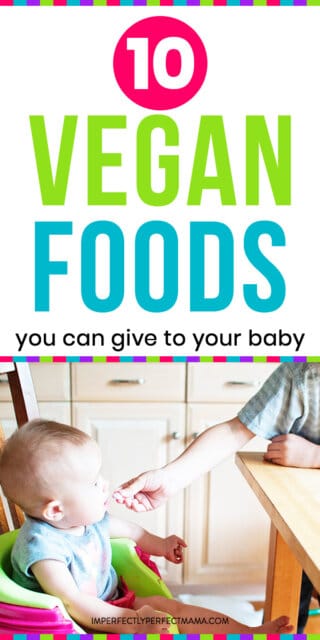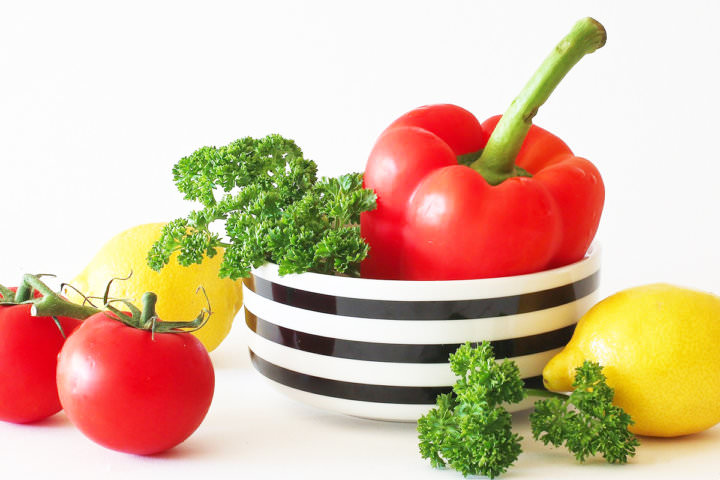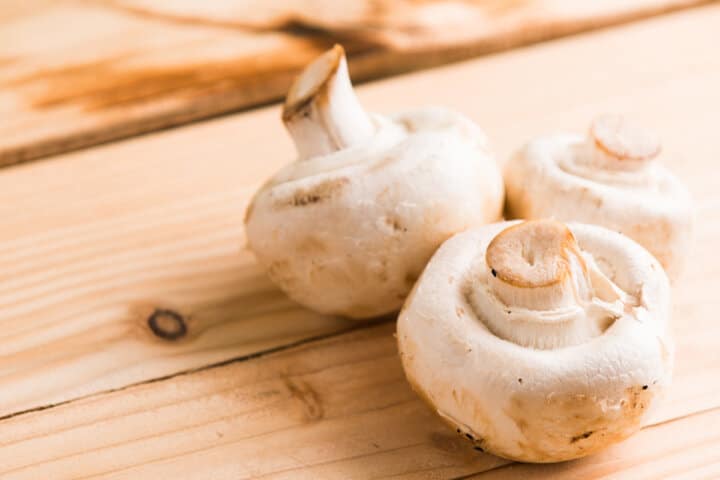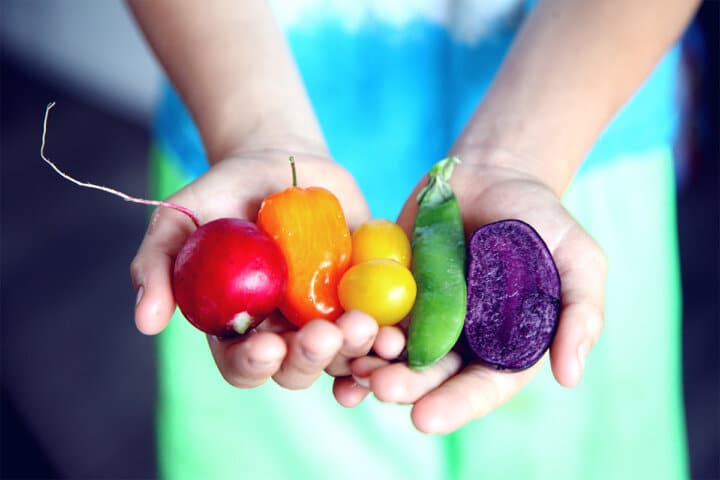Everything is ready and in place for your new baby – and so are you.

You’ve spent countless hours reading and preparing for THAT moment. Nothing can scare you.
Oh, wait – one thing might.
You are vegan and you want to feed your baby with vegan food.
But you don’t know what food is actually safe for a baby.
However, you don’t want to give up a vegan diet.
What can you do?
Is it Safe to Have a Vegan Baby?
Let’s say it right at the beginning:
If properly planned, a vegan diet is suitable for all stages of the life cycle, including pregnancy, lactation, infancy, childhood, adolescence, older adulthood, and for athletes.
With a vegan diet, toddlers 6 months and older get all the nutrients they need for normal growth and development only from plants.
Just like for adults, an appropriately planned and balanced vegan diet is healthy for babies too.
Eating a plant-based diet comes with many health benefits, no matter the age. Eating plants reduces the risk of heart attack and cardiovascular and other heart diseases.
Because a vegan diet usually contains less saturated fats, it helps lower blood sugar and cholesterol levels.
On top of that, it prevents diabetes.
Several studies show that thriving on a vegan diet reduces the risk of cancer. That doesn’t sound like a bad life start for your baby, right?
Because a vegan diet is, by default, rich in fruits, vegetables, whole grains, legumes, nuts, and seeds, vegans tend to get more of some beneficial nutrients than meat-eaters.
A vegan diet is more balanced and enables to eat the rainbow. Vegans usually have higher intakes of fibre, vitamin B1, folate, vitamin C, vitamin E, magnesium and iron.
Lastly, vegan diets can be a great starting point for children to learn about nutrients and different healthy food that should contribute to a normal and balanced diet.
Common Misconceptions About a Vegan Diet for Babies

Like any other diet, if the vegan diet is not balanced, it may have some negative health side effects.
The deficiency of some nutrients presents the main concern.
However, every mum wants only the best for her baby. Bearing that in mind, it’s necessary to plan meals for a baby and start introducing suitable foods slowly and gradually.
With the right knowledge and information, the nutrient deficiency usually doesn’t pose any bigger issue.
Vegan adults sometimes might find out that they are a little bit low on vitamin D and B12, calcium, iron, and omega-3 fatty acids. This can be easily fixed by increasing specific foods that are rich in such nutrients.
Some nutritionists are worried that a vegan diet may not provide enough energy, protein, and fats needed for the normal growth of a child.
This misconception comes from a fact that a vegan diet is usually lower in calories and fats and therefore it doesn’t supply enough energy. If this is the case, fortified foods, yeast extract, nuts, seeds, and dark greens usually supply the missing energy and calories.
10 Vegan Foods That Can Be Introduced to a Baby
Now, let’s have a look at 15 vegan foods that you can safely introduce to your baby.
These foods can be introduced to a baby after 6 months. Babies who are 6 months and younger should be exclusively breastfed.
If breastfeeding is not a choice, you should use infant formula fortified with iron or another alternative. Soy milk is usually not an option for newborns as soybeans can be modified and babies might develop a soy allergy.
1. Fresh Fruits
Fresh fruits (and sometimes frozen) are a great source of vitamins. It is an ultimate fast snack for a baby when nothing else is ready to eat.
The variety of fruits is just enormous. When a baby is more than 6 months old, you can start introducing some fresh berries, such as blackberries, blueberries or raspberries. These berries contain a high amount of fibre, vitamin C and antioxidants.
When a baby is older, they can start eating mangos, papayas, apricots, peaches, kiwifruits, nectarines, and pineapples. These fruits are also rich in vitamins and other nutrients that your baby needs.
2. Hummus
Hummus and other bean dips contain a lot of fibre and they are rich in protein. It’s also an amazing source of healthy fats.
The great thing is that hummus can be served with almost anything – cracks, chips and cut vegetables for example.
3. Tofu
When your baby is one year and older, you can give tofu. Tofu scramble or blended tofu for a dip is an easy meal for your baby.
Always check where your tofu originates from and also make sure that your baby doesn’t have a soy allergy.
4. Wheat-free Grains
To be safe that your baby doesn’t have an intolerance to gluten, start introducing gluten-free grains.
Try amaranth, buckwheat, millet and quinoa. Incorporate these grains in a salad or make a creamy porridge.
5. Mushrooms

Mushrooms are an incredible food for babies. They are very soft when they are sauteéd or cooked.
They have a lot of flavour and vitamins, especially vitamins from the B-group. Babies can start eating mushrooms when they are about 9 months old.
6. Dark Green Vegetables
Kale, collard, spinach, baby spinach, broccoli and bok choy are dark green vegetables with the best source of iron, folate, and vitamin K, A, and C for your baby.
Blend them with a piece of fresh fruit and make a delicious smoothie or bake kale leaves and make kale chips. Your baby will love it!
7. Nuts and Seeds
Start feeding your baby with nuts and seeds when he or she is about one year old. Introduce nuts and seeds slowly one by one and always wait at least three days.
If you don’t observe any allergies, great! Try pumpkin seeds, hemp seeds, chia seeds, sunflower seeds, sesame seeds, almonds, walnuts, cashews, macadamia, pecans – there are many options!
8. Coconut Oil
Coconut oil has many health benefits and it’s absolutely safe for your baby. It really improves digestion and helps control the sugar level in blood.
Your baby can consume coconut oil directly as well. Plus coconut oil can be used externally for smoother skin!
9.Plant-based Milk
Once you introduced different nuts and seeds and know that your baby is not allergic to any, you start substituting breast milk for plant-based milk.
Try different types: soy milk, almond, milk, rice milk, and coconut milk.
If you are unsure about the source of plant-based milk in supermarkets, you can easily make them at home. Plant-based milk is a great source of protein and calcium for your baby!
10. Colourful Vegetables

After trying the dark green leafy vegetables, now it’s time for other types of vegetables.
Attempt to get all the colours, for example
- avocados
- carrots
- sweet/white/purple potatoes
- oranges/red/green/yellow peppers
- cauliflower
- peas
- corn
- green beans
- squash, zucchini
You can also try onion and garlic but only in a moderate amount.
Boil or steam your vegetables and mashed them with a fork. Giving your baby the vegetable pureé is an easy way to get a lot of vitamins and minerals.
You can also try a smoothie or vegetable juice. Babies love it!
Babies can Thrive on a Vegan Diet!
There you have it. You don’t have to stress out about having a vegan baby.
A vegan diet is absolutely safe for babies if it’s planned and balanced properly.
Try 10 vegan foods from this article and your baby will be very happy!




Leave a Reply